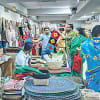‘Bangladesh should utilise people with technical skills’

Educational qualifications get higher priority than professional skills in case of judging any person's ability in Bangladesh, which is why the skilled ones remain unutilised and unrecognised in different sectors, experts said today.
They spoke at a consultation on "TVET and apprenticeship: role of key stakeholders" jointly organised by the SME Foundation and Friedrich-Ebert-Stiftung (FES) Bangladesh at the Parjatan Bhaban in Dhaka's Agargaon.
In advanced economies, there is a system of increasing skills through apprenticeships and formal recognition of those skills in other jobs, Deputy Education Minister Mohibul Hassan Chowdhoury said at the event.
But this trend is not practised in Bangladesh because of flaws in the education system, he said.
The deputy minister thinks opportunities can be given to the interested students to gain apprenticeship work experience even after the completion of their secondary school.
Bangladesh currently has over 11,000 technical and vocational education and training (TVET) institutions, which offer courses of various durations ranging from three months to four years, said Professor Muhammad Shariat Ullah, chairman of the Department of Organisation Strategy and Leadership under Dhaka University.
Despite having so many TVET institutions, 70 percent of the Bangladeshis who went abroad in 2020-21 fiscal year had zero technical and vocational training, he said.
Every year, over 400,000 businesses in Germany offer apprenticeships to high school graduates, which help the students gain quick experience in the workplace along with obtaining higher education, the professor said.
The unemployment rate is also low in the European country thanks to the proper use knowledge and skills, and Bangladesh should also focus now on utilising educational and professional gains of its population, he opined.
Bangladeshi companies can directly hire apprentices in various sectors, including agriculture, food processing, plastic, light engineering and ceramics, said Uzma Chowdhury, director of the Pran-RFL Group.
For this, the technical institutions should focus on producing industry-oriented manpower to help local industries grow further, she said.

 For all latest news, follow The Daily Star's Google News channel.
For all latest news, follow The Daily Star's Google News channel. 








Comments